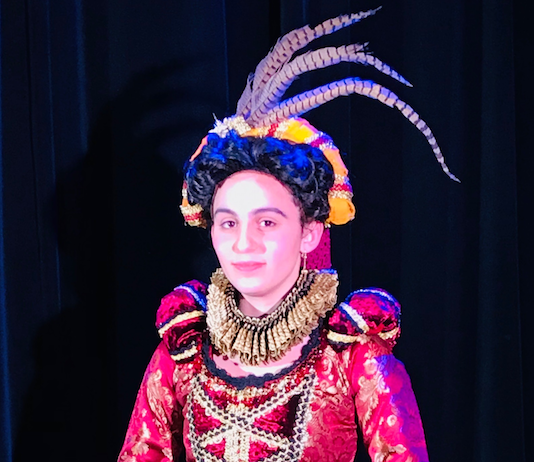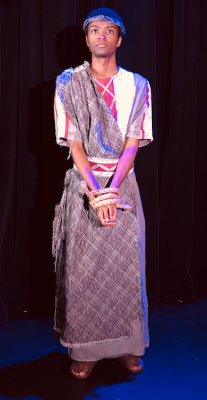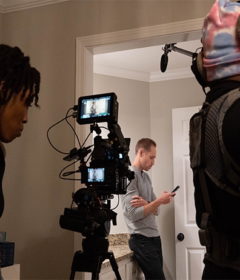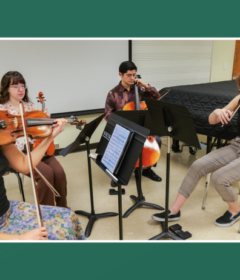Pandemic and Privilege

“We were given the freedom to choose our own character and what monologue we wanted to do, and then write our own monologue in response. When I was first given that announcement, this fire lit up inside me because I was so pumped to inject my own creativity and input into something so meaningful.”
That’s how theatre arts major Kiara Santiago (shown here in costume) described the rather uncommon stage experience.
Fellow senior Noah Belachew called it a “little daunting,” but only at first.
“I started with a character, in my case the son of the antagonist of Shakespeare’s play ‘Titus Andronicus,’ and I worked from there,” said Belachew, an English major. “I thought about what his life would be like, the struggles he’d face growing up in a country hostile to him because of his race and his heritage, knowing that this place, by all rights, should be his home, but struggling with a society telling him he does not belong.”
And so, Stetson Theatre Arts began its 115th season with a truly creative flair for the dramatic — meeting challenges to theatre performance posed by the COVID-19 pandemic and today’s issue of privilege by producing a series of online performances entitled “The Past is Prologue: A Virtual Theatrical Event.”

To produce the series, Stetson Theatre Arts used classic works of literature to confront leading present-day issues. The three virtual episodes are: Confronting the Classics on Race, Confronting the Classics on Gender and Confronting the Classics on Identity. Each was directed by Julia Schmitt, PhD, chair of Stetson’s Department of Creative Arts. The virtual performances debuted on Oct. 8 and continued Oct. 15 and Oct. 22, with the videos still available here.
Further, the effort not only shined the light on an important topic of the day, it also was a showcase of university nimbleness — with innovation that pushed boundaries during an uncertain fall semester.
Schmitt envisioned the event as “an ensemble that will create a production to meet multiple moments.”
“The restrictions of COVID-19 and our commitment to safety means that this project [was] produced, rehearsed and performed virtually,” Schmitt explained. “And our commitment to social justice [meant] that the material [would] be responding to the racial and gender reckoning that is taking place right now, and is long overdue.”
The productions included monologues written by Shakespeare, which were performed alongside original pieces written by students, who were looking to expose and dismantle the pervasive effects of “privilege” that has resulted in systemic oppression still prevalent today.
The messages were resounding on stage, and they were resonant among the students participating.

“I love anything that’s topical and meant to spread messages about injustices, inequality and oppression,” Santiago said. “These topics of gender, race and identity/toxic masculinity have become so prevalent and crucial to today’s generation, and it feels so good to know that we’re at a point where we are not allowing ourselves to stay silent, and that we want to let the world know who we are, where we came from and where we stand.”
“This year has been nothing if not bleak,” Belachew commented. “So, in the midst of all the animosity and despair that’s plagued 2020, I wanted to be part of something that can give people if not hope, then at least solidarity. My hope is that at least a few people will have their struggles reflected in this piece, and that it shows them they’re not alone, that there’s people all across the country going through their pain and that they’re not carrying that weight on their own.”
In addition, each performance was followed by a live Zoom discussion with the nine-member cast and crew.
There were plenty of lessons learned.
“As a young woman of color growing up in this world, trying to navigate it as best I can, studying social sciences as well as theatre and working towards diversity, equity and inclusive excellence, this experience was also almost cathartic for me,” said Aliya Cruise, a double-major in social science and theatre arts. “The issues our country is facing right now, most notably with the Black Lives Matter movement and police brutality, is something that hits home for me and my community.”
In the end, overcoming the challenge of COVID-19, as well as coming to grips with harsh realities of current society, the students grew both in depth of stage portrayal and in their own selves.
“I seek to be an actor, either in stage or film, after I graduate,” said Steven Kalicharan, a theatre arts major. “Having been able to engage in this project, I believe that I have gained a deeper understanding of what it means to take a work like Shakespeare and perform it, not only from the stance of a performer, but as a human being as well.”


